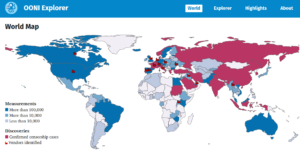OONI aims to equip the public around the world with data that can serve as evidence of internet censorship events. Such data not only shows whether a site or service was blocked, but more importantly, how it was blocked, when, where, and by whom. This type of information can be particularly useful to the following:
- Lawyers: Examine the legality of the type of internet censorship implemented in your country, and use OONI’s data as evidence.
- Journalists: Improve the credibility of your stories by referencing network measurement data as evidence of censorship events.
- Researchers: Use OONI’s data to explore new questions. Researchers from the University of Cambridge and UC Berkeley, for example, were able to examine the differential treatment of anonymous users through the use of OONI data.
- Activists, advocates, campaigners: Inform your work based on evidence of censorship events.
- Circumvention tool projects: Inform the development of your tools and strategies based on OONI’s findings on censorship events around the world.
Read the blog here.
Publisher: The Tor Project
Publication date: 8th December 2016

